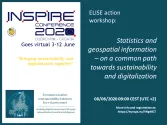
Gazetteers play an important role in enabling location-based services, such as looking up the location of administrative units, streets, and addresses or finding a description of a location based on a given set of geographic coordinates.
Public and private sector services already rely on several existing gazetteers, such as Geonames.org, OpenStreetMap, Google Maps. Depending on the product selected, gazetteers are available for free or against the payment of a fee, rely on authoritative or non-authoritative data and have different geographic and content coverage.
EU Gazetteer Common Service
The Feasibility Study for an EU Gazetteer Common Service investigates the need for and feasibility of developing an EU Gazetteer common service by looking at demand and supply-side aspects of such a service. This study concludes that while there is a need for an EU Gazetteer common service, there still are some questions to be answered by the European Commission and stakeholders before further action can be taken.
On 18 October 2017, a survey was launched to understand the extent to which access to pan-European complete, open and free location datasets and services will create new opportunities for data users and application developers beyond those already available nationally. It also aimed to understand the situations where ‘official’ data is needed, where ‘community-sourced’ data may be applicable, and where such data may be sourced. The survey was commissioned by the European Commission’s Joint Research Centre (JRC) in collaboration with EuroGeographics, the membership organization for European National Mapping, Cadastral and Land Registry Authorities. The results are presented in the EU Gazetteer Survey Analysis document.
EU Gazetteer Evaluation Project
Recently an EU Gazetteer Evaluation Project has been started which aims to develop a 'cultural heritage testbed' used to evaluate the feasibility of using existing Pan European Gazetteer solutions to satisfy users' requirements in terms of lining location with place names and vice versa respecting:
- Temporal aspect
- Multi-lingual aspect
- Use of persistent identifiers
- and to identify other (Pan European) use cases relevant for evaluating Pan European Gazetteer solutions
Check out the report here.


